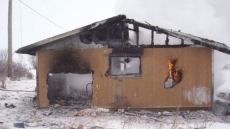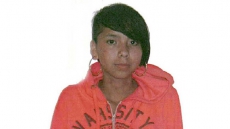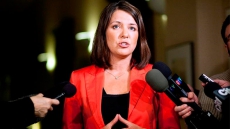For 13 hours straight, the RCMP officer stood guard on what had been a quiet residential street, waiting and watching for a gunman who had shot five of his colleagues and was stalking the woods somewhere behind him.
He and other officers were tucked behind the engine block of their police car in a bid for protection against an assailant known only for the high-powered long guns strapped to his back, hunting knives in his camouflage clothing and an apparent mission to take down police.
The officer, who wanted to remain anonymous for fear of professional repercussions, was busy controlling traffic in one section of the besieged neighbourhood in Moncton, N.B., while a police radio buzzed continuously with possible sightings of gunman Justin Bourque.
As he and his colleagues stood watch, he says they couldn't shake the knowledge that their small police-issue handguns were no match for Bourque's longer-range weapons.
They were, in his words, sitting ducks for a man who had already killed three officers, wounded two others and was still on the loose.
It was only when the radio crackled with news of Bourque's capture near his post on June 6, that their tension eased.
"They came on the radio and said, 'We got him,'" he said. "From there, the intensity level just dropped and it was like an adrenaline rush — like, finally this is over."
The intensity may have ended months ago, he says, but some officers are still shaken by the event and say they didn't receive enough help from the RCMP in coping with the deaths of their colleagues or the trauma of the search for Bourque.
The officer says members — most of whom were mentally, emotionally and physically drained — went to debriefing sessions immediately after the arrest and in the days that followed.
But for many of the hundreds of responding officers not based in Moncton, he says the only followup from the organization was an email letting them know they could attend the sessions in the city.
"They should have gone to each individual detachment instead of doing it through email saying you can attend here on this date," he said.
"They made an attempt. Was it the best attempt? No, there are better options. ... A lot of people wished it would have been more of a personal approach."
The criticism is the latest in a steady volley of complaints from serving and retired RCMP members who say the organization is failing to adequately care for the mental health of its officers.
The claim became particularly pointed over the last year with the suicides of several RCMP officers, at least one of whom went public over his struggles with and attempts to manage his post-traumatic stress disorder.
Cpl. Ron Francis, who served with the Mounties for 22 years, committed suicide in early October after feuding with his superiors about not being allowed to smoke medicinal marijuana while in uniform.
There have been 32 suicides of retired or serving RCMP members since 2006 and his death put even more pressure on the force to address what many saw as a growing problem of operational stress injuries in the ranks.
The force appointed Gilles Moreau as its so-called "mental-health champion" last spring and rolled out a five-year mental health strategy in May that emphasized reducing the stigma around psychological disorders, knowing that 38 per cent of members off on sick leave cited mental health as the reason.
Moreau took on the job as he was about to retire. He was approached by the commissioner to stay on for two more years to lead the mental health strategy and bring about a culture change in an organization accused of not supporting members struggling with psychological distress.
He's trying to lead that change by speaking candidly about his own struggles with mental health problems that at one point found him holding his revolver and contemplating suicide.
It's a powerful story Moreau hopes will move other members to seek help without fear of retribution or shame in doing so.
"That's what we're trying to change — that culture," he said from Ottawa.
"We've seen members with issues and a lot of them have not come forward because they have a fear of repercussions from their managers or colleagues. So, that's the first thing that we are addressing."
Moreau says he's seeing that shift already with weekly videoconferences between commanding officers who discuss incidents, while ensuring a health services officer and RCMP psychologist are called on if needed. They are also promoting the resources available to members, while schooling managers on how to recognize signs of stress and knowing what to do.
He says members can go to a divisional psychologist, health services officer, chaplains, Canadian Forces stress injury clinic, case manager nurse or call a Health Canada number to be referred to a local psychologist.
The response to the Moncton shootings involved a full contingent of care providers, including several health services officers and psychologists, he said. Most members from the local detachment were also given time off, with some still off work.
The incident may serve as a model for the force in how to manage traumatic events, with Moreau and others drafting a guidebook for managers to call on in the future.
"This is the approach we've always wanted to have in the organization and we've used in past incidents, but we want to make sure all managers are aware of this," he said.
"You do not need a major event like Moncton to make sure you call the divisional psychologist and get all the supports to your members."
Still, some say the strategy does not go far enough in making sure officers feel comfortable in seeking help and have the support of their superiors, while also providing robust resources to treat them.
Jeff Morley, a psychologist who served in the RCMP as a frontline officer for 23 years, says he pushed to have a strategy put in place that included research and evidence-based measures to prevent and treat people with PTSD or other stress injuries.
He said that while his attempts got nowhere, he's glad to see the RCMP working to help members cope.
"I think it's a first step — it's very focused on education and stigma reduction, which I think is needed," he said from Vancouver.
"But I think there are huge gaps in the strategy in areas in developing resilience, treating trauma and conducting research to determine the extent of the rates of PTSD and other mental health concerns in RCMP employees."
Others too say the force should never have remodelled a popular peer-to-peer support program that facilitated informal chats between colleagues about personal struggles.
Moreau says they got rid of it because some members were acting like therapists and "taking on roles that were not in their mandate."
For the officer dispatched to Moncton, the program would have provided a personal touch he said was missing from the response to an event that coloured his and others' approach to their job.
"I was affected by it. I've seen some pretty brutal things, but you don't expect to see it in your own country by your fellow countrymen," he says.
"We're working in a rural area and this happened in Moncton and the majority of people who have guns are in rural settings, so it made us all think a little bit differently.
"There are a few members who can't seem to do anything on their own anymore."





